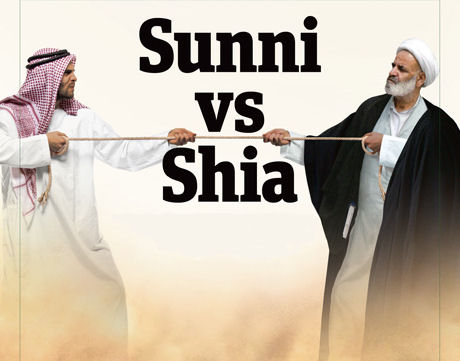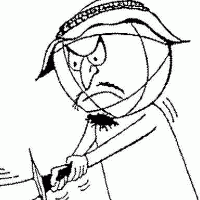![]()
Thu, March 01, 2012 | RubinReports | By Barry Rubin

Cover of the June 20, 2011 New Statesman edition on the Sunni and Shia power struggle in the Middle East. (New Statesman; www.newstatesman.com)
A different version of this article has been published in the Jerusalem Post.
The new Middle East strategic battle is heating up and this is only the start. It has nothing to do with Israel and everything to do with two more serious lines of battle: Arabs versus Persians and Sunni versus Shia Muslims.
The Arab-Israeli or Israel-Palestinian dispute is increasingly unimportant, despite the hatred of increasingly powerful Islamist forces for Israel. The real struggle is over who will control each Muslim majority country and who is going to lead the Middle East. Both issues have almost nothing to do with Israel. At the same time, Israel has virtually no role to play in these struggles, except to ensure that Hamas doesn’t take over the West Bank and the Palestinian Authority.
The Sunni Arab position was stated very clearly by Amr Moussa, a veteran Arab nationalist and candidate for Egypt’s presidency: “[The] Arab Middle East will not be run by Iran or Turkey.” Note that he didn’t even mention Israel, in sharp contrast to how the issue would have been defined in previous decades: as a Zionist threat to rule the entire region.
Iran is Persian-ruled (though only about half the population is ethnic Persian) and Shia Muslim. Turkey is ruled by ethnic Turks even though it is predominantly Sunni Muslim.
What we are seeing again, for the first time in three decades — since President Anwar al-Sadat put the priority on a domestic focus, peace with Israel, and alliance with the United States — is an Egyptian bid to lead the Arabic-speaking world and even the whole region. On this point, Egyptian leftists, nationalists, and Islamists are united. And in the first round, the battle over control of the Palestinian Islamist group Hamas, which rules the Gaza Strip, Egypt won and Iran lost.
Note that this has nothing to do with the current military rulers of Egypt who will be out of power before the end of June. This is a long-term struggle led by the civilian, primarily Islamist, politicians. And it is a program over which the Islamists can unite the country behind them in a wave of patriotic, Arab, and Sunni zeal. Building on this agenda, often used demagogically, also requires Cairo to distance itself from the United States.
Here’s another point to keep in mind. The head of the Egyptian parliament’s foreign affairs committee is now Essam al-Arian, one of the most outspokenly radical Muslim Brotherhood leaders. He’s outspokenly in favor of destroying Israel and U.S. interests in the region. This is one more of an endless amount of evidence about the Brotherhood’s extremism and the coming collision with Washington.
At the same time, al-Arian is strongly anti-Iran, predicting the overthrow of the Tehran regime in an internal revolution. When a Muslim Brotherhood says such a thing that isn’t an example of political analysis but of advocacy.
In another example of Brotherhood, and Egyptian, hostility to the Iran-led bloc, Egypt has pulled Hamas into its orbit. The Brotherhood supports its Syrian brothers in their revolution against the pro-Iran regime in Damascus. It also backs the Bahrain government against Shia oppositionists there and is hostile to Hizballah in Lebanon.
And so despite the fact that Iran has now offered Egypt financial aid, which that country needs, the Egyptians are ignoring the proposal. They do not want to be beholden to Tehran any more than they would be to the United States.
It has not yet been widely recognized that the last year has been a disaster for Iran’s strategy of gaining regional leadership. Outside of Syria, Bahrain, and Iraq — where Tehran is backing forces which aren’t doing so well at present — only in Lebanon does Iran still have real influence. Its potential appeal is now limited to the Shia Muslims, who are minorities everywhere except in Bahrain and Iraq.
Two years ago, an Iranian nuclear bomb would have sparked a wave of pro-Iran reaction throughout the Middle East, now it will have little effect on (Sunni, Arab) public opinion. Similarly, two years ago threats to wipe Israel off the map made Iran more popular while hostility toward Israel did the same for Turkey. Now such ranting does nothing to promote Iran’s or Turkey’s regional influence.
For Turkey, too, the “Arab Spring” ended that Islamist regime’s regional ambitions. Nobody needs the Turks as regional leaders. Indeed, efforts to claim such a role have created intense resentment in both Egypt and Iran.
In contrast, the Muslim Brotherhood has expanded its influence to a remarkable extent. Aside from probably ruling Egypt, the Brotherhood can now claim the Gaza Strip, Tunisia, and Libya as being within its sphere of influence. And it is also the patron of the Brotherhood branches in Syria and Jordan.
Another result of this process is the orphaning of the Palestinian Authority (PA), which has no foreign patron whatsoever. Iran, Egypt, and Syria back Hamas. The PA’s patron should be wealthy Gulf states, notably Saudi Arabia and Kuwait. Yet it has never won back their support after the rupture caused when PA leader Yasir Arafat backed Iraq’s takeover of Kuwait in 1990-1991.
A weakened PA has no maneuvering room except to protect its militant credentials by refusing to negotiate or compromise with Israel while talking in a radical manner. The Israel-Palestinian peace process has in fact been dead since 2000 but only now is most of the world acknowledging the obituary.
This is the new Middle East, quite different from the region as understood for the last sixty years. The battle for predominance among the three strong Arab nationalist regimes — Egypt, Iraq, and Syria — has now given way between Sunni and Shia blocs. Increasingly, Arab assessments of threats from Egypt in the west to the Persian Gulf on the eastern end barely mention Israel at all.
Barry Rubin is director of the Global Research in International Affairs (GLORIA) Center and editor of the Middle East Review of International Affairs (MERIA) Journal. His book, Israel: An Introduction, has just been published by Yale University Press. Other recent books include The Israel-Arab Reader (seventh edition), The Long War for Freedom: The Arab Struggle for Democracy in the Middle East (Wiley), and The Truth About Syria (Palgrave-Macmillan). The website of the GLORIA Center and of his blog, Rubin Reports. His original articles are published at PJMedia.



 RSS
RSS










Such fascinating and intricate machinery whirring and buzzing.
A multi-fractal layered chessboard of humanity and technology. A modern day Gordian knot.
What if they threw a war and nobody came? If people could somehow overcome the brainwashed trance and see the light refuse to fight.
Western enlightened progressives are trying to cleanse humanity of differences such as religion and race and gender to create a utopian society with enforced political correctness. This lopsided federal government power creates a rift with those who resent government intrusion in such intimate personal matters.
Evil exists no matter what humanity will find reason to fight. Like a Pachinko game fascinating to watch the balls all fall down.
Is Obama Sunni or Shiite?